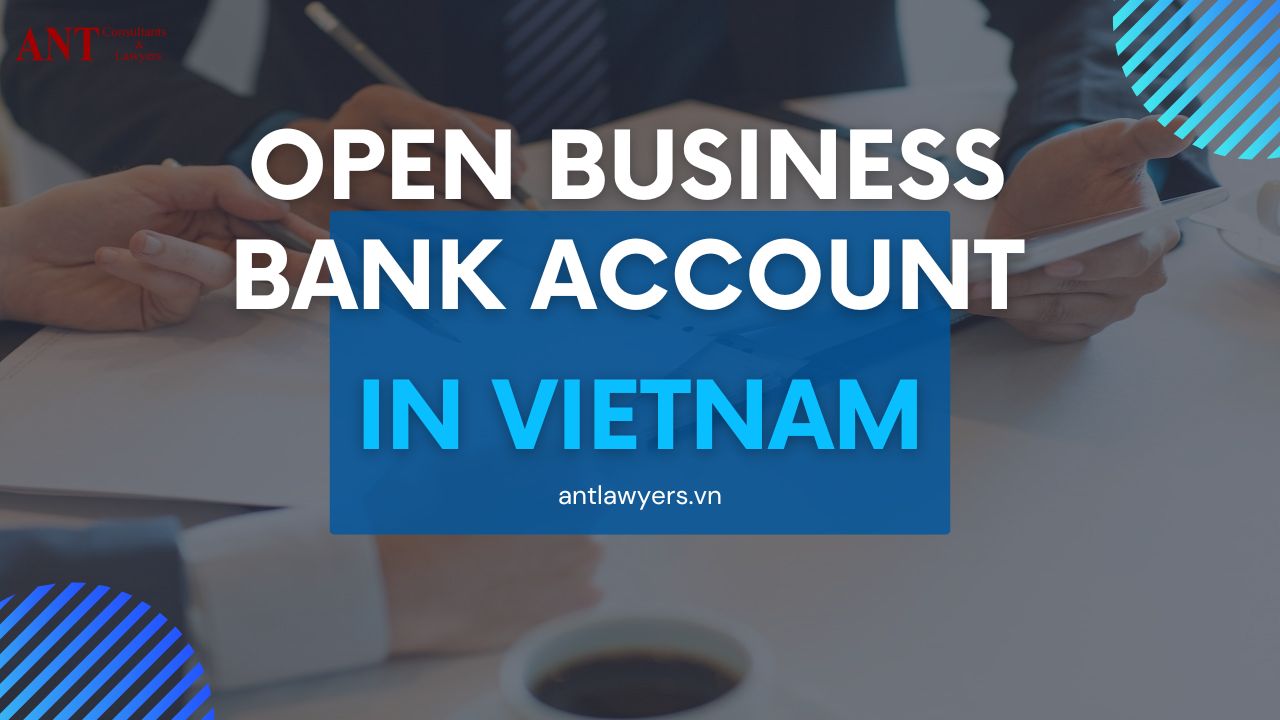7 Essential Steps for Seamlessly Opening a Corporate Bank Account in Vietnam


Opening a corporate bank account in Vietnam is a crucial step for businesses looking to operate. However, the process can be both rewarding and challenging, depending on your knowledge of the local banking system, compliance requirements, and the overall business landscape.
Vietnam’s banking regulations, while improving over the years, still feature variations across different financial institutions, especially in terms of their Know Your Customer (KYC) policies, documentation requirements, and UBO (Ultimate Beneficial Owner) tracing.
The following will walk you through the essential steps of opening a corporate bank account in Vietnam and shed light on common obstacles that can hinder the process.
Why Opening a Corporate Bank Account in Vietnam is Critical
Whether you are a startup or a multinational enterprise, opening a corporate bank account in Vietnam is essential for conducting daily operations, managing expenses, and receiving payments from clients and partners, making payment and transferring money abroad.
It serves as the financial backbone of your business and is mandatory once you have set up company in Vietnam.
However, this process involves more than simply walking into a bank asking opening a corporate bank account in Vietnam. With each bank having different policies, some may offer more easy terms, while others follow strict guidelines.
In some cases, banks in Vietnam might even trace the Ultimate Beneficial Owner (UBO) to the individuals with the smallest interest, which may impact your selection of the right bank.
Key Benefits of Having a Corporate Bank Account in Vietnam
- Facilitates business operations: Helps you manage operational expenses, payroll, and transactions in the local currency (VND).
- Local credibility: Having a Vietnamese bank account provides local credibility and can improve relationships with suppliers and customers.
- Financial transparency: Vietnamese banks offer services that enhance your ability to track and manage your financial transactions in accordance with local laws.
Challenges to Consider
- KYC and compliance hurdles: Some banks enforce strict KYC (Know Your Customer) protocols, which can slow down the process of opening a corporate bank account in Vietnam.
- UBO tracing: Depending on the bank, they may trace ownership up to individuals with minimal interests, which can complicate ownership structures.
- Varying bank policies: Each bank has different policies for foreigners or companies with foreign shareholders, requiring a deep understanding of each bank’s specific guidelines.
Step 1: Ensure Your Company Is Fully Registered
Before you can begin the process of opening a corporate bank account in Vietnam, you must ensure that your company is fully registered and licensed to operate in the country. A corporate bank account can only be opened once your business entity is legally recognized.
Essential Documents for Company Registration
- Business License: This is the certificate that proves your business is legally registered.
- Investment Certificate: For foreign-owned companies, an investment certificate may be required, which demonstrates that the business has been approved for foreign investment.
- Charter/Articles of Incorporation: This document outlines the company’s internal regulations, including ownership structure and operational guidelines.
Step 2: Choose the Right Bank for Opening a Corporate Bank Account in Vietnam
One of the most important decisions when opening a corporate bank account in Vietnam is selecting the right bank. Each financial institution has its unique set of policies, KYC requirements, and compliance checks. You will need to consider factors such as the bank’s reputation, services, and ease of conducting international transactions.
Local vs. International Banks
- Local Banks: Local Vietnamese banks often provide easier access to local payment networks and relationships. They may also have more lenient policies for local companies.
- International Banks: International banks have a more global presence and may offer better services for international transactions, though their KYC process can be more stringent.
Key Factors to Consider Opening a Corporate Bank Account in Vietnam
- KYC Requirements: Some banks in Vietnam may impose strict Know Your Customer protocols, requiring detailed identification and verification of company owners and directors. Others may be more flexible, depending on their risk tolerance.
- UBO Tracing: For banks with stricter compliance, Ultimate Beneficial Ownership (UBO) tracing can go deep into ownership structures, which can make the process cumbersome for companies with complex ownership.
- Transaction Fees: Ensure that the bank offers competitive fees for local and international transfers.
- Customer Service: Choose a bank with a solid reputation for offering good customer service, especially for foreign-owned businesses.
Step 3: Gather the Necessary Documentation Opening a Corporate Bank Account in Vietnam
Opening a corporate bank account in Vietnam requires an extensive set of documents, and missing even one document can delay the process significantly. It is critical to gather and prepare all necessary paperwork in advance to ensure a smooth experience.
Commonly Required Documents
- Company Business License: Proof of company registration is mandatory.
- Certificate of Incorporation: For foreign companies, a certificate of incorporation is usually required.
- Charter of the Company: The company’s articles of incorporation or bylaws, detailing the business operations and ownership structure.
- ID/Passport of Directors and Legal Representatives: Personal identification documents of the company’s directors and legal representatives.
- Proof of Address: Often required for both the company and its owners.
- UBO Documentation: Some banks will request detailed information about the Ultimate Beneficial Owner, including tracing ownership back to individuals with minor interests.
- KYC Forms: Each bank will provide its own Know Your Customer forms that need to be completed by the company representatives.
Step 4: Navigating the KYC and Compliance Process Opening a Corporate Bank Account in Vietnam
KYC (Know Your Customer) is a mandatory requirement for opening a corporate bank account in Vietnam. It is a critical step designed to prevent illegal activities such as money laundering or fraud. Depending on the bank you choose, the KYC process can be straightforward or extremely stringent.
What to Expect from the KYC Process
- Identity Verification: You will need to provide personal identification documents for the company’s directors and shareholders. In some cases, banks may request notarized copies.
- Proof of Ownership: Banks will require a clear understanding of the company’s ownership structure, which can include submitting documentation on shareholders, directors, and ultimate beneficial owners.
- UBO Scrutiny: For banks that have stricter compliance measures, the UBO tracing process may be quite exhaustive, requiring detailed personal information on all shareholders, even those with small stakes in the company.
How to Smooth the KYC Process
- Complete Documentation: Ensure that all the required documents are ready before you visit the bank to prevent unnecessary delays.
- Work with a Consultant: Engaging a local corporate services firm or legal consultant can help you navigate Vietnam’s complex banking regulations more effectively.
- Choose the Right Bank: Some banks are known for having a smoother and faster KYC process. If your business ownership is straightforward, you may want to prioritize these banks.
Step 5: Understanding UBO Tracing
The Ultimate Beneficial Owner (UBO) tracing process involves identifying the individuals who ultimately own or control the company. While some banks in Vietnam have a less stringent approach, others require detailed information on every shareholder, regardless of how small their ownership stake is.
Step 6: Submit Your Application and Wait for Approval
Once you’ve gathered all the required documents, completed the KYC process, and navigated the UBO tracing, the final step is to submit your application. This involves submitting all paperwork to the bank’s corporate banking department, either in person or through an authorized representative.
Average Timeline
The time frame for opening a corporate bank account in Vietnam can vary. In general, the process can take anywhere from 1 to 3 weeks, depending on the bank and the complexity of your business structure.
- Local Banks: Often faster and less complicated, typically taking 1 to 2 weeks.
- International Banks: Due to stricter compliance measures, it can take longer—anywhere from 2 to 3 weeks.
Step 7: Post-Approval: Managing Your Corporate Bank Account
Once your corporate bank account is approved, you’ll receive confirmation, usually via email, along with your account details. From there, you can begin using the account for transactions, payroll, and operational expenses.
Important Features to Consider
- Online Banking: Ensure your bank provides a user-friendly online banking platform for easy access to your accounts, especially if you’re handling international transactions.
- Multiple Currencies: If you operate internationally, a bank that offers multi-currency accounts can simplify your financial management.
- Support and Service: Make sure your bank provides adequate support, especially if you are a foreign investor who may need assistance in navigating local regulations.
About ANT Lawyers, a Law Firm in Vietnam
We help clients overcome cultural barriers and achieve their strategic and financial outcomes, while ensuring the best interest rate protection, risk mitigation and regulatory compliance. ANT lawyers has lawyers in Ho Chi Minh city, Hanoi, and Danang, and will help customers in doing business in Vietnam.
How ANT Lawyers Could Help Your Business?
You could reach ANT Lawyers in Vietnam for advice via email ant@antlawyers.vn or call our office at (+84) 24 730 86 529
Recent Posts
5 Powerful Reasons Why Vietnam Digital Asset Sandbox Is a Bold and Hopeful Move for Innovation
Change is fast. Rules are slow. But innovation can’t wait. As digital assets grow, so…
4 Critical Steps to Effectively Terminate The Employment Contracts with Confidence and Compassion
To terminate the employment contracts can be a complex and often sensitive process, especially when…
8 Insights from a Due Diligence Attorneys in Vietnam for Successful M&A Deals
Navigating the complex landscape of mergers and acquisitions (M&A) in Vietnam can be a daunting…
What 7 Crucial Truths About Arbitration in Vietnam Every Foreign Company Must Know Today?
Let's face the fact, as business owners or directors, would you normally look at dispute…
7 Crucial Legal Challenges Fintech Law Firms in Vietnam Can Help You Overcome for Business Success
Vietnam’s fintech sector is experiencing rapid growth, catching up with the trend of digital financial…
7 Reasons to Set Up a Subsidiary in Vietnam Now: A Powerful and Timely Move Amid Global Shifts
Introduction: The World Is Changing Fast, So Should Your Strategy When the world becomes unpredictable,…




